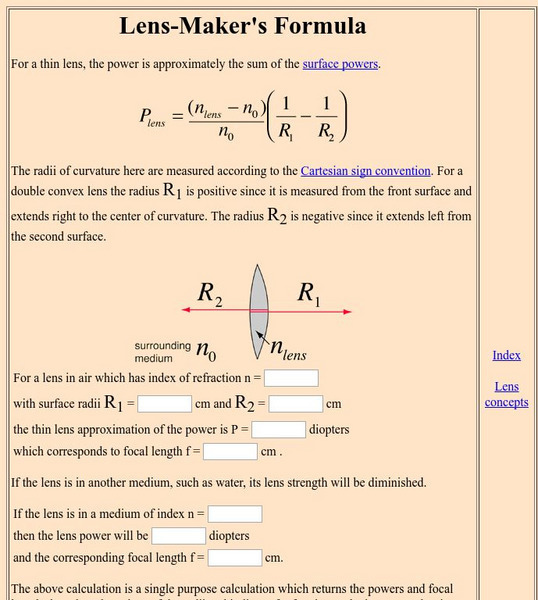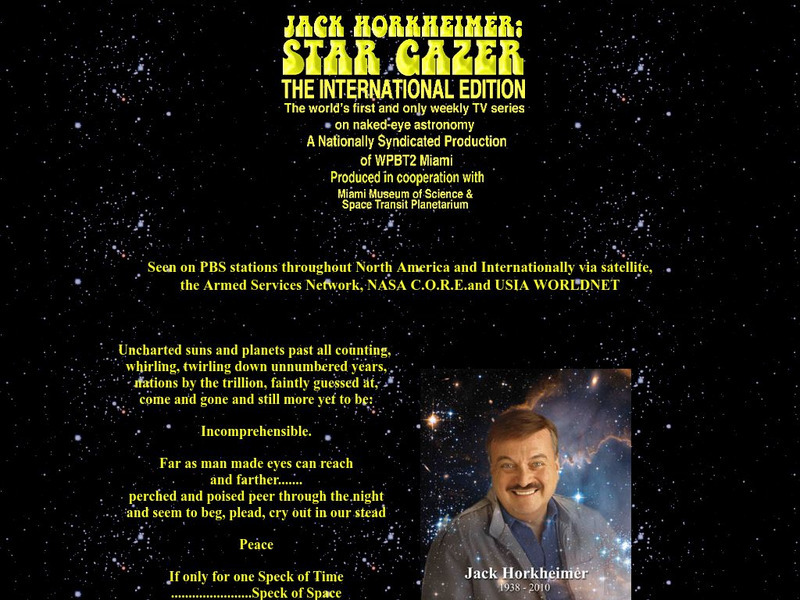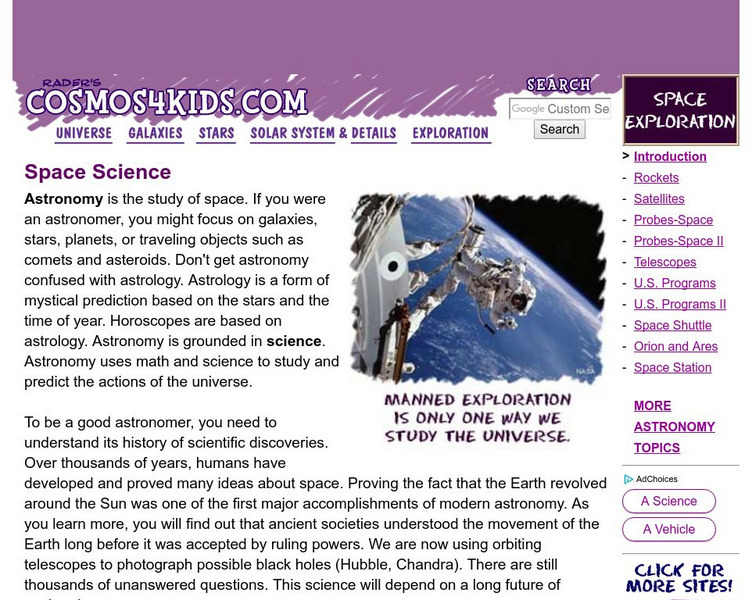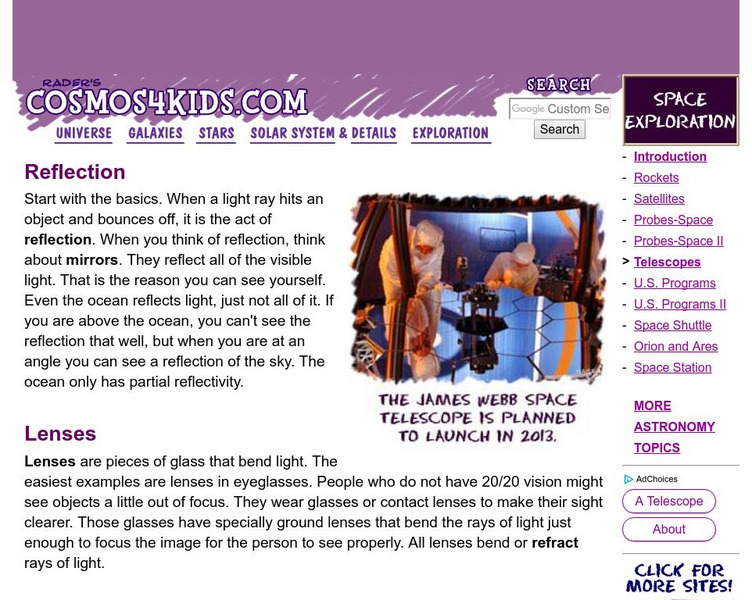Curated OER
Looking into Space
Students explain how telescopes work and how they can contribute to our knowledge of the universe.
Harvard University
Micro Observatory Robotic Telescope: How Does My Eye Compare to the Telescope?
Your eye is an amazing instrument--and so is the telescope! In this activity you will compare your eye's performance with that of a MicroObservatory online telescope. By the end of this lesson you will know exactly what your telescope is...
California Institute of Technology
Cool Cosmos: Ask an Astronomer
Cool Cosmos identifies kid's frequently asked questions about the tools we use in space. Click on the links to find the answer to questions about space stations, telescopes, spectrometers and more!
Georgia State University
Georgia State University: Hyper Physics: Lens Maker's Formula
A discussion of the lens-maker's formula and its use in determining the effect of lens shape and index of refraction upon the magnifying power of a lens. Includes an interactive problem-solving section.
Georgia State University
Georgia State University: Hyper Physics: Thin Lens Equation
This is an informative site from Georgia State University. It gives a discussion of the thin lens equation and an illustration of its use in determining the image distance based upon the object distance and the focal length.
PBS
Pbs Learning Media: Above the Clouds: Telescopes on Mauna Kea
This video segment adapted from First Light explains why the highest peak in the Pacific, Mauna Kea, is an ideal site for astronomical observations. Featured are new telescope technologies that allow astronomers to explore the universe...
PBS
Pbs Learning Media: The Beginnings of the Telescope
This animated essay from the NOVA Web site examines the design of Galileo's refracting telescope and Sir Isaac Newton's reflecting telescope.
University of Chicago
Telescopes at Yerkes Observatory / Virtual Tour
This site describes the difference between reflective and refractive telescopes and includes a virtual tour of Yerkes Observatory which houses the largest refracting telescope in the world.
Space Telescope Science Institute
Amazing Space: Telescopes From the Ground Up
Students can investigate the historical development of six different telescopes. The technical aspects of different telescopes are also presented.
PBS
Pbs Nova: Hunting the Edge of Space
A collection of articles and interactives on the topic of telescopes and what we have learned from them about the universe, including information about some of the strangest phenomena. One section discusses the giant telescopes of the...
Other
National Optical Astronomy Observatory Homepage
The National Optical Astronomy Observatory runs most of the big professional optical telescopes in the United States and this is their homepage. It includes information about the many facilities they run, some of the recent science...
Other
Jack Horkheimer: Star Gazer
This is a site on astronomy in general. If you are into astrophotography, you can find out what is happening in the heavens! Jack Horkheimer is also seen on PBS. You can access the 5 or 1 minute shows on this site.
Other
World Wide Telescope
After downloading the WorldWide Telescope software, students can explore the universe with three-dimensional navigation and narrated guided tours of the sky. Users can also import their own tour to share with others. Site has educator...
NOAA
Noaa: National Weather Service: The Sun and Its Effect on the Earth [Pdf]
The Space Environment Center (SEC) put together a slide show for use by teachers on Space weather. Begin with discussing solar emission and the sun itself. Then end with a summary of climatic effects of space weather, and a note on space...
Other
Aao: The Anglo Australian Observatory Homepage
The Anglo-Australian Observatory located in the center of Australia is a joint venture between the Australian and British governments. Page gives basic information about the observatory and its telescopes. Check out the site map first...
Texas Education Agency
Texas Gateway: What Are Telescopes Used For?
Scientists use telescopes to study the various components of the universe. How do telescopes work? Learn here about the electromagnetic spectrum and the various types of telescopes.
Space Telescope Science Institute
Space Telescope Science Institute: Hubble Site
Explore the universe and celestial phenomena made visible by Hubble. High-quality photos of planets, stars, nebulae, and galaxies, complete with individual descriptions, can be viewed online and downloaded for printing and personal use.
Other
University of Bradford: Bradford Robotic Telescope
Allows students to submit a request for a telescope in England to view a portion of the sky. The telescope is robotically controlled via the internet.
Other
European Southern Observatory: La Silla Paranal Observatory
Paranal Observatory is an astronomical observatory operated by the European Southern Observatory (ESO). It is located in high on a mountain in the Chilean desert. Although the site is geared toward the professional astronomer, you can...
Cosmos 4 kids
Cosmos4 kids.com: Exploration
Space can be explored in many different ways. Read about space exploration and click on the topics on the right margin to find out how man finds out about his universe.
Cosmos 4 kids
Cosmos4 Kids: Exploration:telescopes
Learn how telescopes work .. terms like reflection, refraction, different kinds of lens, and more. The brief, to the point text makes this site most suitable for younger researchers.
Exploratorium
Exploratorium: Make Your Own Telescope
At this site students can make their own telescope and see how it works with this experiment. Out of a light, a pair of glasses, a magnifying glass and wax paper.
PBS
Pbs: Nova: Hunting the Edge of Space
Hour One of Hunting the Edge of Space, "The Mystery of the Milky Way," includes information on the Milky Way and chronicles the history of telescopes from Galileo's time to today's planet-searching telescopes. Hour Two, "The...




















